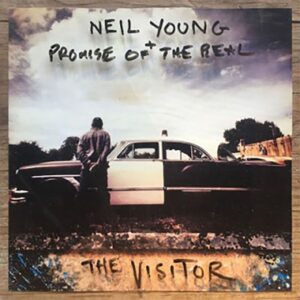I’m not going to lie, I am far from being an objective critic when it comes to Neil Young. Although I am quite content to turn a critical eye upon his immense back catalogue, I can’t get past the fact that I own more albums By Neil Young than any other artist, largely because I find his work endlessly fascinating. He may not always succeed in his ventures (‘Trans’ being a prime example), but his work is emotionally and artistically honest in a way that few other, gazillion-selling acts have ever managed to achieve. Whereas most artists at least acknowledge the tightrope of commerciality that must be walked, Neil seems to have remained blithely oblivious to the balancing act of fame, simply releasing albums as and when the muse takes him. As such, he stands as one of a very small number of long-serving artists who has never attempted any sort of commercial rehabilitation in the wake of a perceived failure. Indeed, a look at the arbitrary path that Neil has taken over the years – the monstrously-successful albums and the unfinished projects – suggests that little Neil does is planned in any coherent way and that lack of guile does much to explain his ascendency over the alternative scene of the mid-90s. Those bands, so dictated to by a stringent policy of emotional honesty, recognised Neil’s purity and embraced it as a counterpoint to the artifice that predominates in the music industry.
As befits the turbulent times currently engulfing the world, ‘The visitor’, Neil’s second album with his coruscating new backing band, promise of the real, is a turbulent album. It’s interesting (and not a little relieving, if we’re honest) to see that Young, who initially adopted a wait-and-see attitude to Trump, is now to be found violently rebuking the President for his divisive rhetoric. It makes for a powerful album, delivered with far more fire and fury than the politically-motivated ‘living with war’, and Young gets off to a cracking start with the stinging, grungy ‘already great’, a track that sonically harks back to the Pearl Jam collaboration of ‘Mirror ball’ with its churning guitar and sampled chants from a crowd of protestors. Throw in some brilliantly ragged piano from Micah Nelson, and you’ve got the sort of blues-infused, grungy rock that Neil Excelled at on ‘Chrome Dreams II’. That ragged guitar tone remains for the powerful ‘Fly by night deal’, a track that throws Sonic youth-esque spoken-word vocals over Anthony LoGerfo’s exemplary percussion, the track building to some blistering guitar work as it progresses. A short track, it gives way (in under three minutes) to the gorgeous ‘almost always’, a countrified track that captures Neil in ‘Harvest’ mode with his trusty acoustic guitar and harmonica fully present and correct. On ‘stand tall’, Neil and Lukas (Nelson) let their guitars rage and spit fire over a funky backdrop that casts a knowing glance back to ‘Sleeps with Angels’, still one of Neil’s most sonically rewarding albums. Driven by the powerful subject of climate change, the song sees Neil at his vitriolic best, slamming Trump with lines like: “the boy king don’t like science, it goes against the big money truth, his playpen is full of deniers, they’ll flush our future down the tubes.” A quieter, more introspective moment, ‘change of heart’ ends the first half of the album on a country-trip, Neil’s voice gently tracking the setting of the sun over a glimmering prairie.
Perhaps the most surprising track on the album, the lengthy ‘carnival’ is an eight-minute piece with a mariachi vibe and a swirling, childlike melody reminiscent of the titular entity. In contrast, ‘diggin’ a hole’ is a dusty blues track with gang vocals that brings to mind Nick Cave and the Bad Seeds at their most dilapidated. With its huge rhythm and orchestral flourishes, ‘children of destiny’ nods in the direction of ‘Storytone’, running the risk of edging into Disney-esque sweetness, only for the punishing beat to bring it (just about) back on track. It’s a surprisingly theatrical piece of music, but in the context of the record it works, albeit as the weakest track on offer. As the album heads towards its epic conclusion, Neil engages in a brief, funky blues entitled ‘when bad got good’, summoning the creaking ghost of Crazy Horse before heading into the ten-minute closer, ‘forever’. Not the epic guitar work-out that might be hoped for, ‘forever’ is largely acoustic, and gently whimsical, finale to an album that consistently surprises the listener with its stylistic leaps. As such, the final surprise is that the track is not actually surprising at all, with Neil indulging that acoustic, country-infused side that he likes to let off the leash from time to time (most notably on ‘a treasure’). It’s ne of those lengthy Neil tracks that, somehow, doesn’t actually feel lengthy at all, and the shimmering guitar that graces the second half of the track is quite beautiful.
‘The visitor’ is not perfect, even my rose-tinted glasses allow me to make such a concession, but then few Neil Young albums actually are perfect. It is, however, a very good Neil Young album with occasional glimpses of greatness. Like all Neil Young albums, it is a snapshot of Neil at a point in time. It reflects his beliefs, his influences and his heart as accurately as any mirror might reflect his appearance and its honesty is a quality that remains most beguiling. Promise of the real continue to impress as Neil’s current backing band, and the production (handled by Neil, John Hanlon and Niko Bolas) is typically organic, capturing as close as possible what it must have sounded like in the studio. Ultimately, ‘The visitor’ is another example of Neil Young’s enduring greatness, and is well worth a listen. 8




